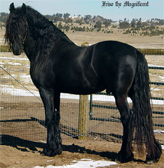Tips on Maintaining the Health of Your Horse’s Hooves
Maintaining your horse’s hooves is just as important as proper nutrition and exercise. Hooves are made up of various internal and external structures. If these parts are not taken care of properly, it could negatively impact your horse’s balance and stability. While stability and balance are extremely important, horses also rely on their hooves to act as a second heart in their bodies. As blood is pumped throughout a horse’s body and reaches the legs, the hooves act as a pumping mechanism, and sends the blood traveling back in the body through an extensive network of veins. Caring for such a vital part of a horse is crucial to keeping him in the best of health. Below are tips on maintaining your horse’s hooves in order to ensure they are strong and healthy.
Checking, Cleaning and Maintaining
You should regularly check your horse’s hooves and remove any dirt, stones, or manure that may be stuck on them. Removing this extra debris can help prevent infections or punctures to the hooves. Each time you bring your horse in, check their hooves for turnout injuries or objects in the hooves. Take an extra couple of minutes after you’ve pried out any packed debris to gently clear the crevice of the frog (see photo), and scrape any remaining bits of matter off the sole, with the tip of the pick. You want to be able to see the sole’s entire surface, so finish the job with a stiff brush. Some hoof picks come with a brush attached, or you can buy a brush separately and inexpensively.

When picking out the hooves keep an eye out for punctures, cracks or abscesses. Another important thing to watch for is signs of a common infection that occurs in horses is called thrush. Thrush is a fungal infection that is characterized by a rotting odor coming from under the hooves. Thrush is caused as a result of unsanitary conditions and from unhealthy hooves. It is important to consult with your vet if you think your horse may have a problem with their hooves.
Canker is another infection to be on the look out for. Though not commonly found, it is similar to what causes “foot rot” in sheep. The bacteria associated with canker causes abnormal keratin production, or overgrowth of the horn. This excess proliferation occurs underneath the horn, as the infection spreads throughout the epithelium. The horse’s owner will notice the presence of a white or gray matter that is moist and spongy and looks similar to cauliflower. If there is enough infection, heat might be felt in the hoof, but only in extreme situations. Canker can be difficult to treat. Equine Medical and Surgical Associates have experience in this area and can help you treat such infections. Our Canker Powder is guaranteed to clear canker in 30 days! See more info on our product below!
Scheduling regular farrier visits, checking your horses shoes if they are shod and learning how to remove shoes are all important factors in keeping their hooves in the best condition possible.
Exercise
Proper exercise is essential to maintaining healthy hooves. Regular exercise will increase the circulation in the horses legs, and toughen up the hooves to make them stronger and healthier. Horses that are not able to get the proper amount of exercise are more apt to get some of the infections and problems that we have discussed. Allowing daily turn out time is extremely important to their health in so many different ways. Keep them active!
Diet
A horse’s diet can also greatly affect their hooves health. A diet rich with vitamins and nutrients is a great way to promote healthy hooves, as well as a healthy lifestyle in general. Vitamin Supplements are always a great nutritional boost All horses are different, so again, it is important to consult with your vet on the proper dietary needs of your animal!
As a horse owner, it is important to maintain your horse’s healthy hooves. Hooves require proper maintenance in order to function properly. They are essential to a horse’s balance, stability, and blood flow. Proper exercise, diet, and incorporating vitamin supplements into the daily routine are great ways to keep your horse’s hooves healthy and strong.





; ?>/wp-content/themes/twentyten/img/NMImacLogo_150.jpg)






